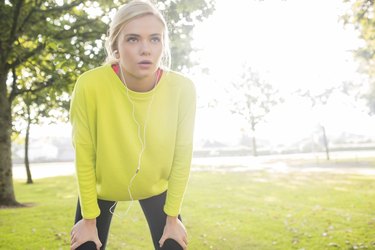
Shortness of breath or breathing problems involves difficult breathing unrelated to the intensity of physical activity. Breathing problems after a workout may be a side effect of medication, a symptom of a health problem or an indication of stress or anxiety. Stopping to catch your breath after a strenuous workout is normal, while wheezing, tightness in the throat and a barking cough may indicate a more serious problem. Consult your physician if you consistently have trouble breathing after exercise.
Exercise-induced Asthma
Video of the Day
Tightness in your chest, wheezing, coughing or shortness of breath may be symptoms of exercise-induced asthma. Individuals with exercise-induced asthma generally have no symptoms except during physical activity. Several factors can worsen asthma symptoms, including cold or dry air, high pollen counts, chemicals, respiratory infections or air pollution. While aerobic exercise is more likely to trigger asthma symptoms than strength training, proper treatment can put you on the path to performing intense aerobic exercise. If you suspect you have exercise-induced asthma, consult your physician for treatment options.
Video of the Day
Pharmaceutical Side Effects
Individuals who take certain medications may experience breathing problems after exercise as the result of a side effect related to the pharmaceutical. Medications that help your body retain potassium, such as those for premenstrual syndrome or heart conditions, include shortness of breath in the list of side effects. Interferon, which is prescribed for cancer and hepatitis patients can also affect breathing. Seek medical attention immediately if you experience breathing problems each time you exercise or if additional symptoms, such as chest pain or nausea, are present.
Excess Stress
A small amount of stress in your life is often helpful, as it can help with motivation and production. Too much stress, however, can be harmful to your physical, mental and emotional well-being. Consistent stress often leads to anxiety, which often includes physical symptoms including headaches, rapid heart rate and breathing problems, according to MedlinePlus. An intense workout when you feel stressed or anxious may cause breathing problems. Additionally, extra caffeine, smoking and lack of sleep increases the risk of breathing problems after workout. Daily physical activity, a healthy diet and relaxation techniques can relieve stress and reduce the chance of breathing problems following a workout.
Effects of Aging
Your lifestyle, physical condition and age all play a role in breathing problems after exercise. The rate of air that travels through the lungs begins to gradually decline after age 30, making it more likely that you'll experience shortness of breath after a workout. Muscles between the ribs and those that make up the diaphragm weaken as you age, which makes them work harder to provide necessary air flow. Regular exercise actually improves your lungs breathing capacity. Avoid smoking and other air pollutants to minimize the effect aging has on your lungs. Take a break if you experience shortness of breath, or talk to your doctor if you suspect a more serious condition.
Is this an emergency? If you are experiencing serious medical symptoms, please see the National Library of Medicine’s list of signs you need emergency medical attention or call 911.